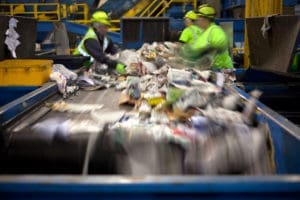 As recycling initiatives pick up steam nationwide and increasing numbers of states and communities embrace easier, more convenient recycling programs, legislatures are starting to consider more aggressive regulations around something called extender producer responsibility (EPR).
As recycling initiatives pick up steam nationwide and increasing numbers of states and communities embrace easier, more convenient recycling programs, legislatures are starting to consider more aggressive regulations around something called extender producer responsibility (EPR).
EPR is a fundamental element of a larger economic approach known as a circular economy. Essentially, a circular economy is an approach to manufacturing and recycling aimed at reducing wasting and avoiding pollution in two ways – through the use of biological nutrients which re-enter the biosphere to break down safely, and technical nutrients, which are high quality components that can be recaptured and re-used over and over again in the manufacturing process.
By extending producer responsibilities for their products and the materials used to make them, governments are mandating that companies assume end-of-lifecycle responsibility for what they use and how they use it. EPR systems and programs, such as the one now in place in California managed by the Department of Resources Recovery and Recycling, require manufacturers to fund and manage recycling and disposal programs for their products. In the United Kingdom, government regulations now require packaging manufacturers to ensure a certain proportion of their packaging is recovered and recycled.
According to the publication Resource Recycling, Rhode Island and Connecticut have considered EPR laws to finance and manage their recycling systems, and some Canadian provinces, including British Columbia, have them on the books.
At Urthpact, we’re working hard to produce high-quality, Earth-friendly products from bioplastics and 100 percent post-industrial recycled resins. Our goal is to reduce our environmental footprint and create ecologically-sound products that can either stay in the manufacturing cycle for a significantly-extended period of time or be composted to break down into nutritional components that can nourish the soil.
We believe everyone bears the responsibility to be a good steward of the planet which, for manufacturers, includes embracing an end-of-life program that ensures the recycling and reuse of materials after the original product has outlived its usefulness. For us as a plastics manufacturer, it’s about reducing our dependence on conventional plastic materials to significantly reduce the harm they can cause to this planet.



